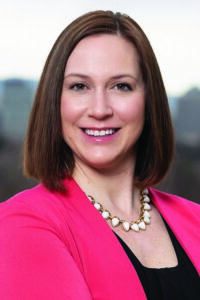
By Caitlin Quander, real estate attorney at Brownstein Hyatt Farber Schreck
Throughout my 15 years as a commercial real estate attorney, I’ve never seen anything quite like the COVID-19 pandemic in terms of quick, effective and necessary change.
It’s complicated, and with some exception, the child-rearing challenges from “stay home” policies largely fell on women. Over the last few years, I have also seen positive adjustments—greater understanding for imperfectly balanced home lives, the ability to be more comfortable in corporate settings, and more openness about and accommodation for employees’ needs.
However, women are still struggling. According to the 2022 “Women in the Workplace” report from LeanIn.Org and McKinsey, women remain wildly underrepresented in corporate leadership with only one woman for every four C-suite executives, and only one woman of color for every 20. Women are leaving the traditional workplace in historic numbers to find better opportunities.
Earlier this year, I was elected president of the board of directors of NAIOP Colorado, our state’s branch of the leading commercial real estate industry organization in the country. When I was asked to consider leadership, I wondered for a moment if I was qualified. A second later, I wondered why this thought had crossed my mind.
I’ve spent years, 11 of them as a member of NAIOP, building an expertise in land use and commercial real estate. As much as I owe my successes to mentors and colleagues who guided and commiserated with me while I rose from associate to shareholder at my law firm (and I do owe them!) and peers who traded opportunities as we honed our practices, I also credit my own hard work and commitment to learn and grow my capabilities.
It feels a bit unnatural to list my accomplishments and qualities. This humility, perhaps even doubt, about my own leadership skills is something I share with other women I know — women trailblazing in their own fields and unquestionably exceeding at the challenges thrown at them. I want to help change this by instilling confidence in women about their own qualifications. When I encourage a female associate to take on a leadership role or a NAIOP peer member to lead a committee, I see this pattern play out. I remind the women who doubt themselves that seeing a project through and meeting someone on a human level is what creates a relationship or a new client. It’s not always shaking hands at networking events.
During my term with NAIOP, I want to encourage women to own their power: their skills, resilience, ingenuity and empathy. Women may have more opportunities in 2023 than they did in 1973, but we are still doubting our ability to live up to expectations that come with those opportunities. Women tend to need to be asked to take on leadership, as was the case for me, instead of seeking out and stepping into that space with confidence.
Gender inequality is not yet vintage. Today, women still struggle with pay inequity, disproportionate harassment and gendered expectations related to child care, emotional labor and administrative tasks — both at home and at work. The McKinsey report found that only 87 women, and only 82 women of color, are promoted from entry-level roles to management for every 100 men who are promoted. For every woman at the director level who gets a promotion, two other women are choosing to leave for better opportunities.
It’s here that I have to contend with my privilege. I have faced many hurdles in my career, but I’ve been lucky to have a firm that values diversity, inclusion and equity and a husband who contributes to the household and child care in a way that lets me prioritize my career as much as he does his. Women of color as well as LBGTQ+ individuals face even greater disadvantages and I am asking myself and others what we can do to bring more women along with us when we do ascend to leadership.
Men have always been able to climb corporate ladders, take up space even in unfamiliar spaces and stroll into boardrooms with big ideas — and no one is likely to question it. By contrast, women, and the white male leaders already above them, may still ask if they have what it takes to be in boardrooms at all.
Perhaps what the women leaving their roles for better opportunities have learned, and what society is still learning, is that the on-the-ground, behind-the-scenes, face-to-face work many of us do can be a great leverage point for leadership. Someone may come in with a good idea, but perhaps they can’t build a coalition behind them or cultivate the intimate understanding needed to push the whole process forward. But someone who has a good idea along with experience mediating conflict, getting familiar with granular processes, navigating ego and personal preferences and stringing together resources may have the intangible qualities needed to be an exceptional leader.
The COVID-19 pandemic accomplished at least one positive outcome: We’ve seen what can happen when the system needs to bend and stretch to accommodate a different reality, and we need to keep insisting on these changes until we see parity in leadership.
With expertise in land use and zoning, general real estate matters and urban renewal and public finance, Caitlin Quander, real estate attorney at Brownstein Hyatt Farber Schreck, has over a decade of real estate experience. She brings strong local ties to Colorado-focused projects.









